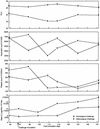Doxycycline hyclate treatment of experimental canine ehrlichiosis followed by challenge inoculation with two Ehrlichia canis strains
- PMID: 9527787
- PMCID: PMC105415
- DOI: 10.1128/AAC.42.2.362
Doxycycline hyclate treatment of experimental canine ehrlichiosis followed by challenge inoculation with two Ehrlichia canis strains
Abstract
Dogs were experimentally inoculated with Ehrlichia canis Florida to assess the efficacy of doxycycline hyclate for the treatment of acute ehrlichiosis. Treatment with doxycycline eliminated infection in eight of eight dogs. Untreated infected control dogs appeared to eliminate the infection or, alternatively, suppress the degree of ehrlichiemia to a level not detectable by tissue culture isolation or PCR or by transfusion of blood into recipient dogs. Prior infection did not infer protection against homologous (strain Florida) or heterologous (strain NCSU Jake) strains of E. canis. We conclude that doxycycline hyclate is an effective treatment for acute E. canis infection; however, these results may not be applicable to chronic infections in nature. Spontaneous resolution of infection, induced by the dog's innate immune response, provides evidence that an E. canis vaccine, once developed, might potentially confer protective immunity against the organism.
Figures




References
-
- Adawa D A Y, Hassan A Z, Abdullah S U, Ogunkoya A B, Adeyanju J B, Okoro J E. Clinical trial of long-acting oxytetracycline and piroxicam in the treatment of canine ehrlichiosis. Vet Q. 1992;15:118–120. - PubMed
-
- Bartsch R C, Greene R T. Post-therapy antibody titers in dogs with ehrlichiosis: follow-up study on 68 patients treated primarily with tetracycline and/or doxycycline. J Vet Intern Med. 1996;10:271–274. - PubMed
-
- Buhles W C, Huxsoll D L, Ristic M. Tropical canine pancytopenia: clinical, hematologic, and serologic response of dogs to Ehrlichia canis infection, tetracycline therapy, and challenge inoculation. J Infect Dis. 1974;130:357–367. - PubMed
-
- Codner E C, Farris-Smith L L. Characterization of the subclinical phase of ehrlichiosis in dogs. J Am Vet Med Assoc. 1986;189:47–50. - PubMed
Publication types
MeSH terms
Substances
LinkOut - more resources
Full Text Sources
Other Literature Sources
Medical

